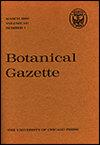Cone Idioblasts of Eleven Cycad Genera: Morphology, Distribution, and Significance
引用次数: 17
Abstract
Sporophylls from strobili of 16 species among 11 genera of cycads were examined for idioblasts. Thin-walled secretory-like idioblasts were found in the majority of taxa and thick-walled sclerenchyma-type idioblasts were found in the minority. With the exception of Cycas rumphii and Stangeria eriopus, where secretory idioblasts were in the epidermis and/or hypodermis, none were found in the sporophyll parenchyma of these species. Most idioblasts stained ninhydrin-Schiff-positive, and tannins were present also. Sporophyll idioblasts appear to be related to interactions with insect predators and/or cosymbionts and may form part of a complex pollination syndrome. The lack of idioblasts in stem tissue and low concentration in leaflet tissue of Zamia furfuracea compared with sporophyll tissue is significant support to this hypothesis. On the basis of almost universal occurrence of these idioblasts in the sporophylls, we suggest that insect symbiosis related to pollination may be common to most cycad genera.苏铁11属的球果异母细胞:形态、分布及意义
对苏铁11属16种球孢子的孢子叶进行了异母细胞鉴定。大多数类群中存在薄壁分泌样异母细胞,少数类群中存在厚壁厚壁组织型异母细胞。除了苏铁(Cycas rumphii)和葡萄树(Stangeria eriopus)的表皮和/或下皮层中有分泌异母细胞外,这些物种的孢子叶薄壁中没有发现分泌异母细胞。大多数异母细胞呈茚三酮-希夫阳性,单宁也呈阳性。孢子叶异母细胞似乎与昆虫捕食者和/或共生体的相互作用有关,并可能形成复杂授粉综合征的一部分。与孢子体组织相比,茎组织中缺乏异母细胞,小叶组织中异母细胞的含量较低,这有力地支持了这一假说。基于这些异母细胞在孢子叶中几乎普遍存在,我们认为与传粉有关的昆虫共生可能在大多数苏铁属中普遍存在。
本文章由计算机程序翻译,如有差异,请以英文原文为准。
求助全文
约1分钟内获得全文
求助全文

 求助内容:
求助内容: 应助结果提醒方式:
应助结果提醒方式:


